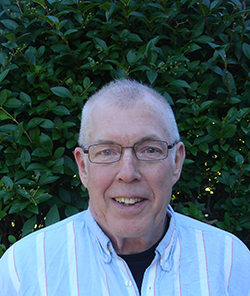|
In my first creative writing workshop, at Goddard College, we used to type our poems onto ditto masters, which we would then turn in to the instructor, to be run off on a mimeograph machine, producing the fragrant purple-inked sheets so familiar to anyone my age. The dark mirror image of one of my poems on the back of the master sheet had a solid and official look to it, my words transformed into something to be sent out into the world, As I typed onto the master, I could see the faces of the other kids in the workshop, and I would think about how much I wanted to impress them with the purple letters of my mimeographed poems.
The excitement of knowing that people were reading my thoughts, and perhaps being moved by them, has stayed with me. It was my good fortune that my thoughts were sometimes interesting enough to be admired.
Being propelled more by interior forces than by outside issues has also been a weakness that I've needed to compensate for. The one thing I've been able to count on is that I've figured out how to write good sentences.
I've always loved the passage in The Elements of Style where E.B. White recalls that his teacher William Strunk "felt that the average reader was in serious trouble most of the time, a man floundering in a swamp, and that it was the duty of anyone attempting to write English to drain this swamp quickly and get his man up on dry ground, or at least throw him a rope." What a humane way to think about your reader! I also like Lawrence Block's dictum that the act of writing an unpublishable novel is not a failure but rather an investment.
I dislike the phrase "read like a writer," but of course a writer has to read, intensively, searchingly, and joyously. Remember, though, that quantity isn't the object; books are not items on a syllabus to be dutifully checked off one by one, as if on a birdwatcher's life list. You can be a good writer without having read War and Peace. And rereading a favorite book can be as much fun as reading it for the first time. I think it's also important to become an expert in one writer, and to know that person's work backward and forward.
You should have somebody, a friend or relative, that you can send stuff to, even it's just one person; that way your words are always participating in the linguist's triangular diagram of author, work, and reader. "The Whistle Car" would never have been published if my sister Barbara had not told me to get rid of the first section.
What else can I tell you? Be curious about things. Have a favorite sentence. Write every day. Eavesdrop on people's cell phone conversations. Don't try to be dark, or cool, and don't smoke weed.
|


